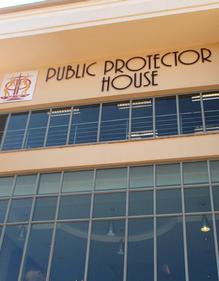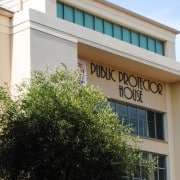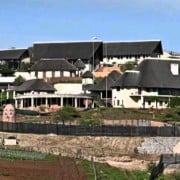|
Getting your Trinity Audio player ready...
|
 Source: Office of the Public Protector
Source: Office of the Public Protector
Public Protector Thuli Madonsela has attributed the ongoing confusion on the powers of her office to the tendency to delink the office from other independent institutions established under chapter nine of the Constitution and the fact that the Public Protector Act is not in line with the Constitution.
Addressing law students at the University of Fort Hare in East London on Tuesday, Madonsela said section 181 of the Constitution provided generic powers that were applicable to all institutions referred to as Chapter Nines. These include, among others, her office, the Auditor-General (AG), the Human Rights Commission and the Independent Electoral Commission (IEC).
Chapter nine includes sections 181 to 194 of the Constitution, which apply to the appointment, removal from office, and functioning of all the chapter nine institutions and their respective heads.
Madonsela was speaking to the students on promoting excellence through accountability, transparency and openness. She is known for embodying these qualities, and in 2014 was the recipient of Transparency International's Integrity Award in recognition of her dedication to her work.
She also spoke to the Fort Hare students about the constitutional mandate of her office. Corruption Watch has, on several occasions, expressed concern that the powers of the public protector are not fully understood or respected.
Able to perform without fear, favour or prejudice
Among other things, the generic provisions of section 181 include that these institutions are independent and subject only to the Constitution and the law; they must be impartial and must exercise their powers and perform their functions without fear, favour or prejudice; and no person or organ of state may interfere with their functioning.
Madonsela said the root cause of the confusion over the powers of her office was the tendency of critics to divorce the section of the Constitution that makes these provisions from Section 182, which gives her office investigative, reporting and remedial powers.
“Once you take away the public protector from Section 181 and debate it in abstract with other ombudsman institutions, you have lost the plot,” she explained. “If you do not delink Section 181 from 182 you are not going to view the public protector’s powers differently from those of other institutions established under chapter nine.”
Madonsela argued that if Parliament could review the decisions of her office and substitute it with its own determinations, it would have to do the same about the determinations of the AG and the IEC, among others independent constitutional institutions.
“If you were to stretch this argument further, you could say that if the IEC makes a decision that [a political] party did something wrong and it must be excluded from the electoral process, the review institution will not be a court of law but Parliament, which will say ‘IEC you are wrong, the party stays and it will contest the elections because you are not a court of law’,” she said.
Madonsela said views that suggested that Parliament or any other public functionary other than the courts could review the decisions of her office placed the office outside Section 181 of the Constitution.
The problem regarding the enforcement of her office’s remedies, she added, was exacerbated by the fact that the Public Protector Act was enacted in 1994, two years before the Constitution came into force. This was evident in that the Constitution gives her office the power to “take appropriate remedial action”, the wording that is not found in the Act. Instead, the public protector said, the provisions of the Act are similar to those found in the interim Constitution of 1993, which in turn are similar to those of the Office of the Ombudsman that existed during apartheid South Africa.
Madonsela emphasised that, unlike a commission of inquiry, her office had original powers deriving from the Constitution. A commission of inquiry only got its powers from the executive and upon conclusion of its work, had to report to its power giver.
She noted that in his latest judgment on the DA vs SABC case, Western Cape High Court Judge Ashton Schippers held that it was important that the confusion regarding the powers of her office be resolved and that the Supreme Court of Appeal should be the forum for that determination.
“My team and I share values that this institution [the Public Protector] needs to provide an avenue for access to justice and if it can’t do that, then it has no place in the South African Constitution,” she said.
In a statement released in October 2014, Corruption Watch noted that Schippers' judgment is "likely to be appealed to a higher court. Corruption Watch has an interest in this case, since the Public Protector is often the last defence against corruption and malfeasance in public office. We will accordingly apply to intervene as amicus curiae in due course".






